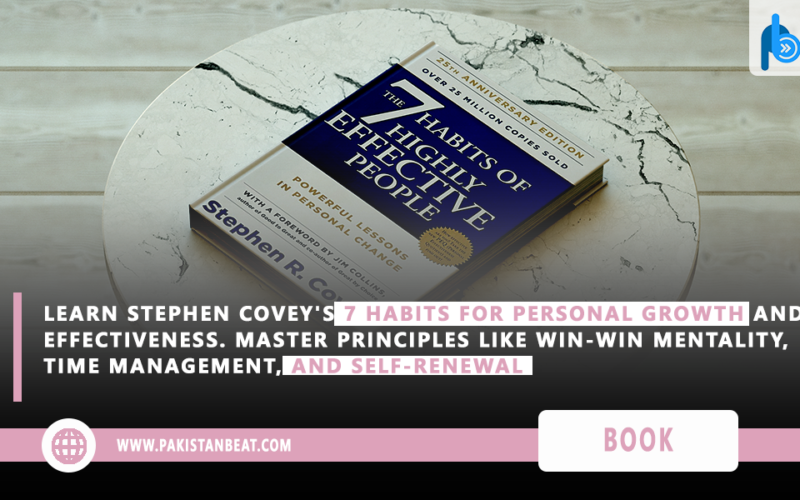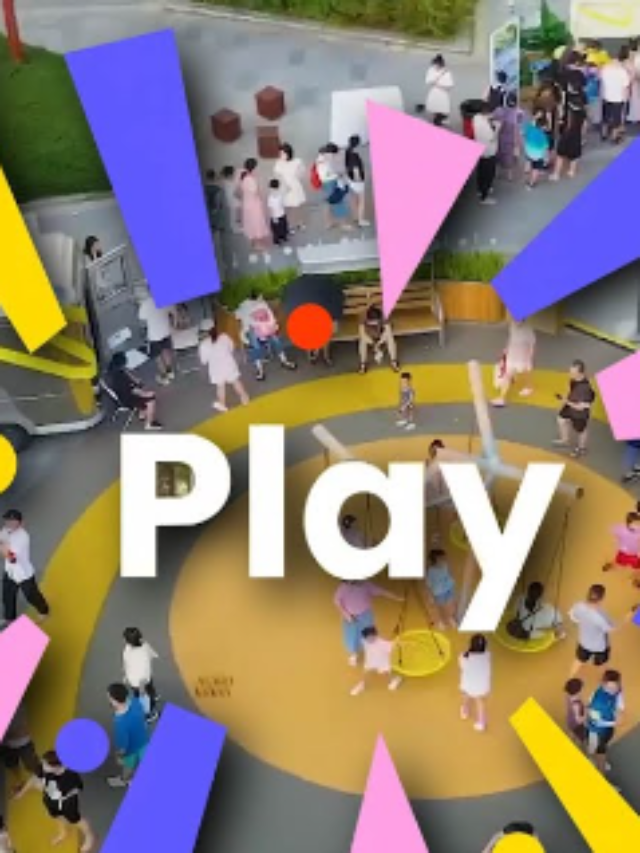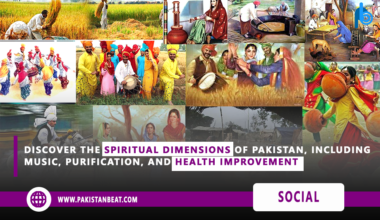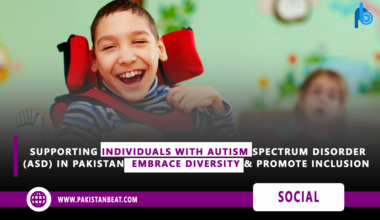Stephen Covey’s ‘The 7 Habits of Highly Effective People‘ is a seminal book on personal development and leadership. It provides a principle-centered approach for solving personal and professional problems, offering a step-by-step pathway for living with fairness, integrity, and human dignity.
The 7 Habits of Highly Effective People – Stephen Covey
1. Be Proactive
Proactive individuals take charge of their lives. Instead of reacting to external circumstances, they focus on what they can control and take responsibility for their decisions.
- Proactive Approach: Focus on what you can control and make choices based on your values and principles.
- Reactive Approach: Focus on external factors, leading to feelings of victimhood and blame.
Example: A proactive person faced with a difficult work project would focus on planning, organising, and seeking solutions, rather than blaming others or external conditions for the challenge.
Proactive vs. Reactive Focus
Proactive people concentrate on their Circle of Influence, expanding it through positive energy. In contrast, reactive individuals focus on their Circle of Concern, leading to negative energy and a shrinking Circle of Influence.
Key Takeaways:
- Language: Replace reactive language with proactive language (e.g., “I control my own feelings”).
- Tasks: Transform reactive tasks into proactive ones.
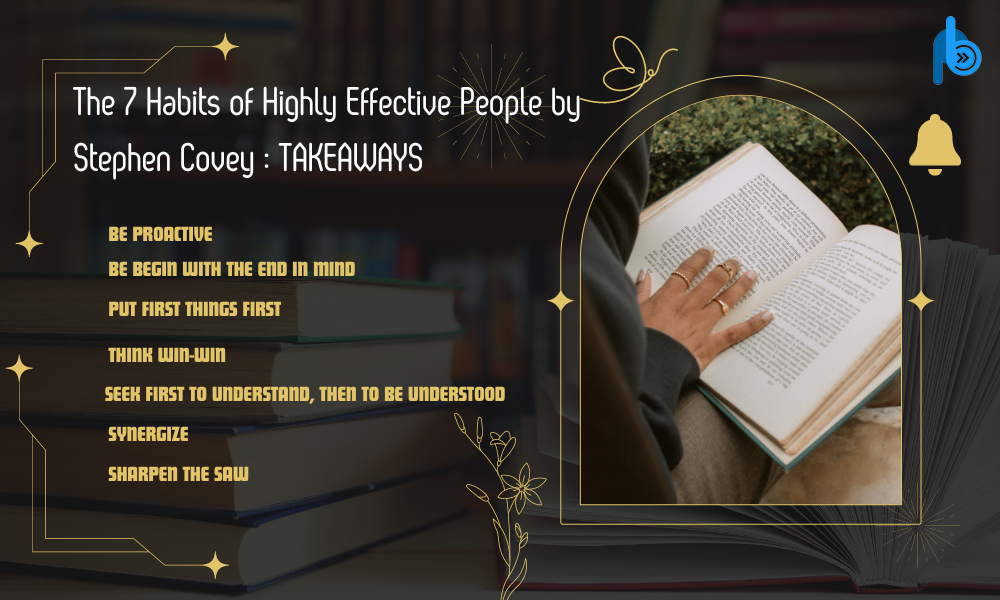
2. Begin with the End in Mind
Imagine your own funeral. How do you want to be remembered? This habit is about clarifying your goals and values to guide your actions.
- Personal Mission Statement: Define your values and principles.
- Leadership: Set a strategic vision and identify what you aim to achieve.
- Rescripting: Change ineffective scripts written for you by asserting your values.
Example: Writing a personal mission statement can help you stay focused on what is truly important in your life, such as integrity and compassion, guiding your daily actions and long-term goals.
Key Takeaways:
- Roles and Goals: Break down different roles in your life and set goals for each.
- Face Your Fears: Write down your biggest fears, visualise handling them, and plan your response.
3. Put First Things First
This habit is the execution of the first two habits. It involves being disciplined, managing your time effectively, and prioritising important tasks over urgent but less important ones.
Urgent vs. Important Tasks
Tasks fall into four quadrants of urgency and importance. Focus on Quadrant II (important, non-urgent tasks) to enhance personal management and prevent crises.
Example: Prioritising family time and personal development over less important tasks like checking social media ensures that you are working towards long-term goals rather than immediate gratification.
Key Takeaways:
- Neglected Activities: Identify and commit to important activities you’ve been neglecting.
- Time Management: Create a time management matrix and log your time to focus on Quadrant II.
4. Think Win-Win
Seek mutually beneficial outcomes in all interactions. This habit is about finding solutions where everyone wins.
Paradigms of Human Interaction
- Win-Win: Mutual benefit for all parties.
- Win-Lose/Lose-Win: One gains at the expense of another.
- Lose-Lose: Everyone loses.
- Win: Personal success without considering others.
- Win-Win or No Deal: If mutual benefit isn’t possible, there’s no deal.
Abundance Mentality
Belief in enough resources and success for everyone fosters collaboration and cooperation.
Example: In a negotiation, a win-win mindset would seek solutions that benefit both parties, ensuring long-term relationships and mutual satisfaction.
Key Takeaways:
- Upcoming Interactions: List what others need and how to meet those needs.
- Relationships: Identify ways to give more than you take in important relationships.
5. Seek First to Understand then be Understood
Listen empathetically and actively before communicating your own views. This builds trust and respect.
Reflective Listening
Paraphrase and check for accuracy to ensure you understand others’ perspectives.
Example: In a team meeting, actively listening to colleagues’ concerns before presenting your ideas fosters an environment of respect and collaboration.
Key Takeaways:
- Observe Communication: Watch interactions and note emotions conveyed without words.
- Empathy in Presentations: Understand the audience’s point of view and address their problems.
6. Synergize
Collaboration can achieve greater outcomes than individual efforts. Value differences and combine strengths to reach new solutions.
Principles for Synergy
- Value Differences: Appreciate unique abilities and perspectives.
- Third Alternative: Create solutions beyond compromising.
- Listen to Understand: Focus on empathetic listening.
- Be Open to Feedback: Use feedback for improvement.
- Build Trust: Foster honesty and openness in relationships.
Example: When working on a project, bringing together team members with different skills and perspectives can lead to innovative solutions that wouldn’t be possible individually.
Key Takeaways:
- Irritating People: Understand their views and concerns.
- Successful Teamwork: Identify conditions for synergy and recreate them.
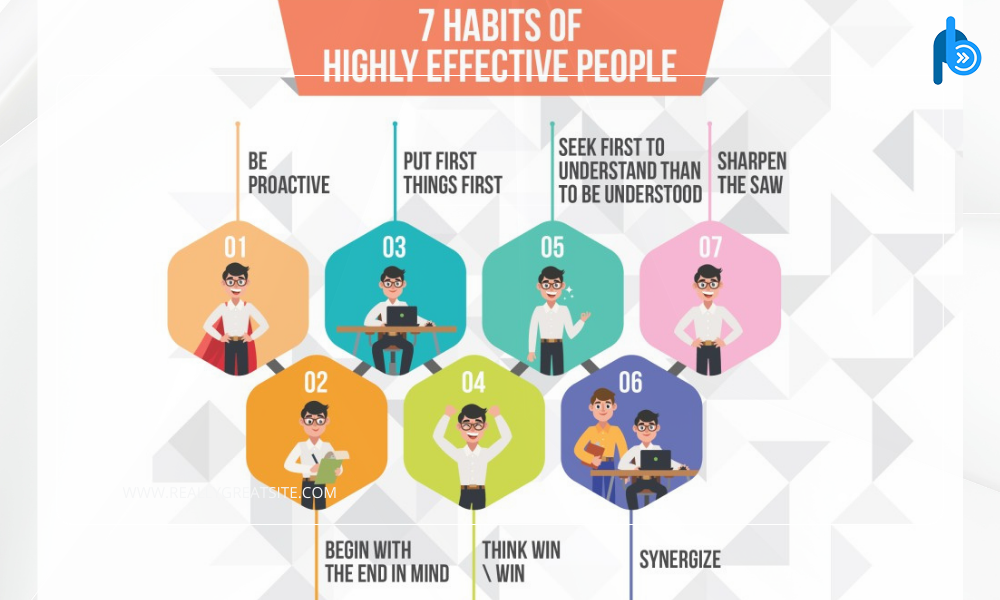
7. Sharpen the Saw
Continuous personal development through self-renewal is essential for effectiveness. Prioritise self-care in four areas: physical, mental, spiritual, and social/emotional.
Physical Renewal
Activities like exercising, eating healthy, and getting enough sleep.
Example: Regular exercise and a balanced diet can improve your energy levels and overall health, enabling you to be more effective in all areas of life.
Mental Renewal
Stimulating and calming the mind through activities like reading, meditation, and learning new things.
Example: Engaging in lifelong learning by reading books or taking courses can keep your mind sharp and open to new ideas.
Spiritual Renewal
Reflecting on values and cultivating a sense of purpose through practices like prayer, journaling, and volunteering.
Example: Regular meditation or prayer can help you stay connected to your core values and find a sense of peace and purpose.
Social/Emotional Renewal
Maintaining healthy relationships and practising empathy.
Example: Spending quality time with family and friends even if it means going beyond your comfort zone. Socialising and quality socialising is vital for emotional well-being even if it doesn’t seem like it at times!
Making Self-renewal , a habit
Covey recommends a proactive approach to making self-renewal a habit. Planning ahead of time and scheduling these activities is the only way to seal the deal. He refers to this as an upward spiral of learn, commit, do, repeat, in which we get better and better at self-care until it starts coming naturally to us. At first, it may seem like a huge burden and a waste of time to specifically planout this type of self-care. However, with time,the need to be proactive decreases as we become accustomed to this habit.
Covey argues attention should be given to all four dimensions since they support and enhance each other. They are like the four pillars , the foundation upon which the entire building of an individual stands . The better we get in one area, the better we will be in all other areas. Similarly, neglecting one aspect limits the impact of the others. He recommends an hour a day be devoted to the first three dimensions, what he refers to as a Daily Private Victory.
According to Covey, unlike the other three dimensions, social/emotional activities don’t require a daily time commitment since you naturally engage in social and emotional activities all day long..But nowadays, with the boost in social media, specially after the covid 19, we are left with more screen-based interactions; be it a call with a client, an online lecture or simply just a remote job that has left many of us introverted. So to tackle this, we should make conscious efforts to meet friends and family in-person and approach these interactions as growth opportunities.
Relatable Blog from this Author:
